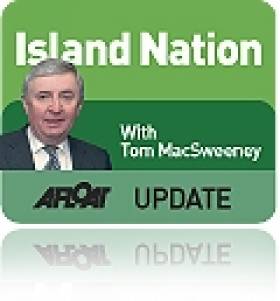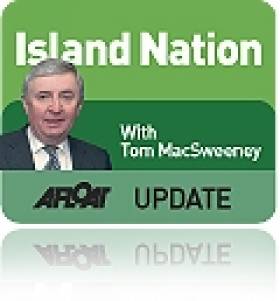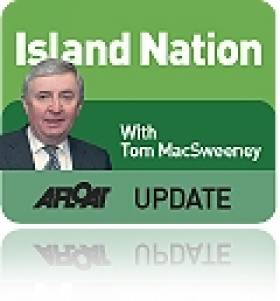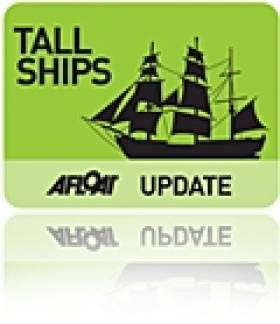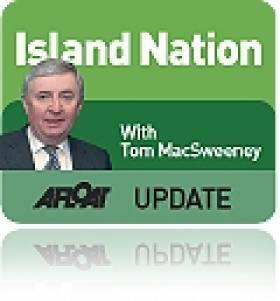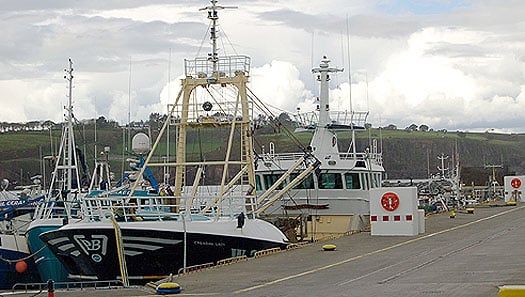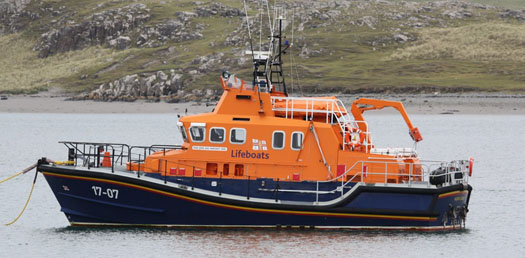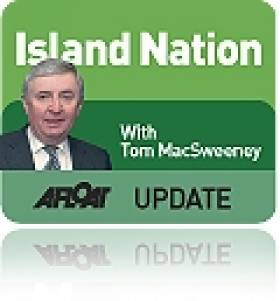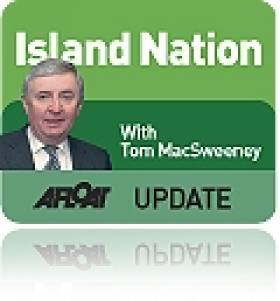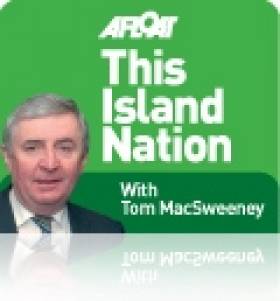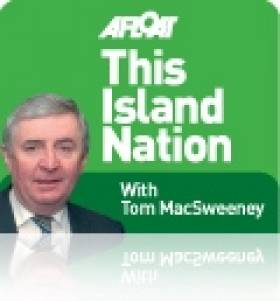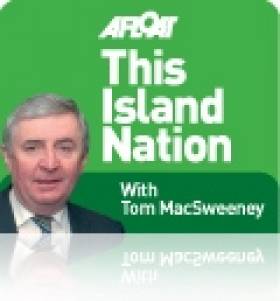Displaying items by tag: Island Nation
This Island Nation Podcast by Tom MacSweeney: August
#islandnation – In this month's programme we have the story of a Soviet take-over of Cork Port, hear that love is in the air at the country's lifeboat stations, with the 45th station due to open shortly; we go to Ireland's longest river, the Shannon, where a boat made famous by Wolfe Tone is being launched; tour Ballycotton Lighthouse, open to the public for the first time and hear about its association with the Irish ship which made the first crossing of the Atlantic by steam; and we discuss whether a Tall Ship is the best method of sail training.
#rorcbdcc – At a time when the future of Irish sailing is under examination by the sport's national association, the Irish success in winning what has been described as the world cup of offshore racing, the Commodore's Cup, is in my view, a considerable boost.
The 'spirit of sailing' appears to be under a degree of challenge at present, though it seems from talking to clubs and groups around the coast that the picture is not gloomy everywhere. However, there is an undeniable loss of numbers in quite a few clubs, a few of them major ones and racing seems to be taking the brunt of this.
It was interesting therefore to meet the Skipper of Team Ireland which won this top trophy in the home of British sailing, for the second time. Anthony O'Leary, members of the Irish team and officers of the Irish Cruiser Racing Association, were given a reception and 'welcome home' with the Cup at his home club, the Royal Cork in Crosshaven on Thursday night.
Those of us who had been competing in the Thursday night league that evening were back ashore at the end of racing, to be part of the occasion and it was interesting to hear Anthony reflect on the background to how the trophy had been won and the planning and commitment required of all those involved. He spoke of the value of learning sailing from an early age and remaining with the sport, but also of the dedication and demands which must be endured to be successful. Sailing can be developed as a lifetime sport from the days of youngsters in Optimists through to the highest levels of the sport, was his message, an issue also referred to by RCYC Admiral Pat Lyons and by the Commodore of the Irish Cruiser Racing Association, Norbert Reilly. These comments must have reflected on the thoughts of Irish Sailing Association President, David Lovegrove, who was also at the RCYC event.
The drop-out of younger sailors appears to be at the core of difficulties in several clubs, where keeping them involved is proving difficult. Perhaps it is the variety of boats or the lack of a pathway in the sport other than the higher competitive levels, or are some younger sailors being driven too hard towards trying to achieve winning as the only mark of being successful?
It will be difficult to resolve these questions but the sport needs to do so and particularly to ensure the involvement of younger sailors.
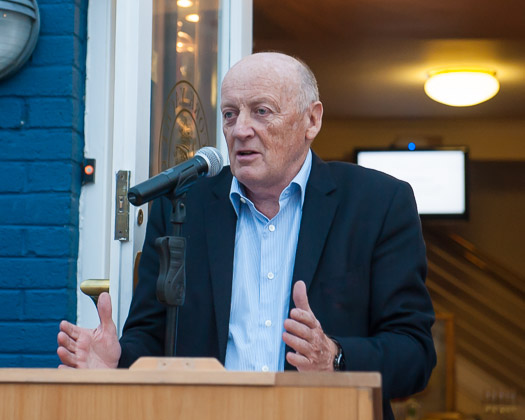
Norbert Reilly of ICRA at Royal Cork Yacht Club
So, what is the 'spirit of sailing'?
'A man must be obsessed about something and a boat is as good as anything.' That quote from E.B.White, an American editor and writer has often been used to summarise the spirit of sailing though, let me be clear that I do not see sailing as a male preserve, nor obsession with it!
E.B.White also wrote about arising in the morning "torn between a desire to improve the world and to enjoy it, which makes it hard to plan the day."
That can occasionally make the choice of going sailing against deploying oneself to more mundane household or even work demands difficult and potentially awkward in domestic relationships!
Most important of all, in my view, is enjoying going sailing. I have always taken the view that, if it is not enjoyable and if one has doubts about going out on a boat, then don't do so. We can be put off by unpleasant weather, though sometimes there is a need to endure it and if one is only involved in cruising, perhaps the boat may be used less than when the disciplines of racing bring a crew together.
An example of this thought process for me was on last Tuesday night when I was invited to take part in the annual Media Challenge organised by the ISA and Providence Resources at the Royal St.George YC in Dun Laoghaire with members of the Irish Olympic Squad. It was a bit blustery when Bill O'Hara as Race Officer outlined what the night's racing would involve in 1720s. These are a pretty demanding keel boat which move quickly. I had not helmed one before and found it challenging, but definitely enjoyable in the prevailing conditions.
Everyone involved declared that they had a good night's sailing though, if one was not involved in racing, one might have stood back, looked at the conditions and thought that remaining ashore was a better choice! But, when you do go out, it most often proves that sailing is fulfilling, can be enjoyable and that it is necessary to understand and attempt to master different conditions.
RED SAILS COMING BACK?
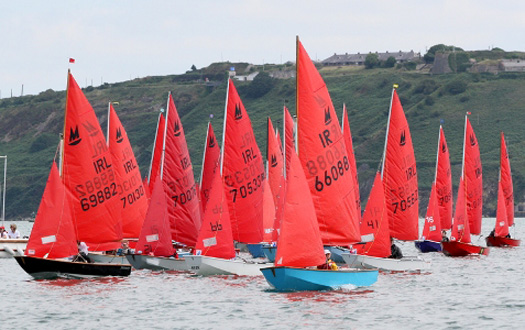
Mirror racing is back in Cork Harbour
Another boat I enjoyed seeing was the Mirror, back racing in Cork Harbour for their Southern Championships, sailed out of the RCYC at Crosshaven. It was good to see the red sails of the Mirror dinghies in numbers again. There were 23 boats, with 46 sailors in all ranging in age from 14 to 50+ It was the biggest turn-out for the 'Southerns' in years, I was told. The first boat I ever owned was a Mirror, which I sailed out of Monkstown Bay Sailing club. They are a great dinghy.
Mirrors hadn't sailed out of the RCYC since 2005. A few former 'Mirror sailors,' now with children of their own, decided it was time to get the boats they had once sailed out of hibernation and see if they were still fit for purpose. Both sailors and boats seemed to be and there is some thought that the event may lead to a revival of interest in this dinghy class in Cork. There was a lot of discussion at the event about the changes from the original wooden boats to the present fibreglass dinghies, with consequent changes in equipment and rigging.
"There is no doubt that the plastic Mirror is a fine design, but a good wooden boat can still challenge them," one of the 'woodies,' said. Indeed, a wooden boat from South Africa won the Mirror World Championships held at Lough Derg Yacht Club last year.
And of course, young Irish sailors have been victorious in the Mirror World Championships.
THE SPIRIT OF KERRY IN OMAN
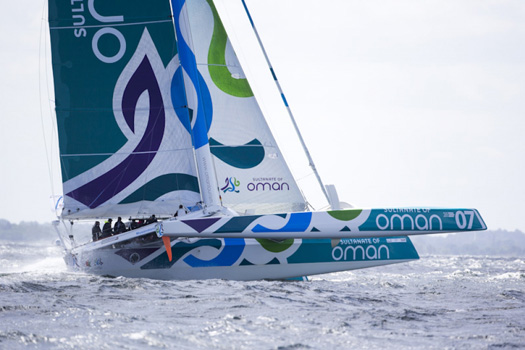
The Oman MOD 70 where Kerry's Damian Foxall (below) is co–skipper
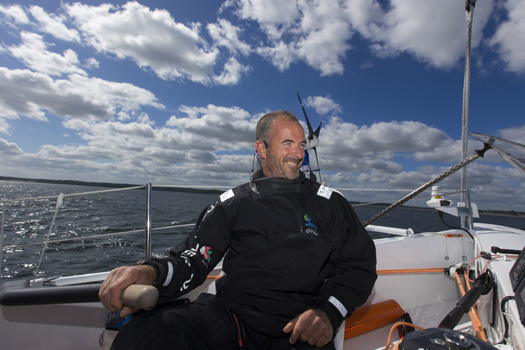
Then there is the spirit of Damian Foxall from Kerry, one of the world's top sailors, who is Skippering the MOD70 of Musandam-Oman Sail in the Artemis Challenge in Cowes Week in the Solent. This is part of the Oman Sail project for which he is working. It is that country's national initiative established in 2008 which "uses the power of sport to contribute to the development of the Omani people," the government says. It is an "equal opportunity project" which runs sailing programmes "for thousands of young Omani men and women, aimed at inspiring a new generation to discover sailing, encompassing a national sailing squad and high achieving inshore and offshore racing teams, all of which benefit from world-class coaching and whose ultimate objective is to win an Olympic medal for Oman." The programme is pledged to teach 70,000 Omani children to sail by 2020 at eight sailing schools, four of which are already operational:
"The goal is to rekindle Oman's maritime heritage while raising the country's regional and international profile as a high-end tourist and foreign investment destination, through competitive sailing at home and abroad. Oman Sail seeks to instil confidence and to teach valuable, transferable life skills to a generation of Omanis."
Wouldn't it be marvellous if this island nation had such a State project and saw its national maritime traditions in such a manner?
Damian Foxall is co-Skipper of Musandam-Oman Sail which is part of the project. The Skipper is Sidney Gavignet of France.
For the past month, Oman Sail skipper Sidney Gavignet (FRA) and a mixed squad of Omani and European sailors have been at the centre of a tough series of inshore and offshore races around the French coast in conditions that varied from very light to downright stormy and produced their best performance since they first entered the event in 2008 by finishing third.
"We had a tough Tour de France, but pulled it off in the end through good team work, our squad really pulled together and we are very happy with the result!" said Sidney Gavignet.
After the Artemis Challenge they will take on the Round Britain and Ireland Race, where a line honours win is their goal.
Jan Dekker, the highly regarded America's Cup and Volvo Ocean Race veteran from South Africa will be with Damian on the MOD70 in the Artemis Challenge.
Gavignet set a Round Britain and Ireland non-stop singlehanded record set in 2010 on the 105ft Trimaran, Oman Air Majan.
"We are looking forward to the Round Britain, it is a challenging race and will be the last crewed race for us before I turn to solo training for the Route du Rhum at the end of the year," said Gavignet.
NOT EVERYTHING IS RACING
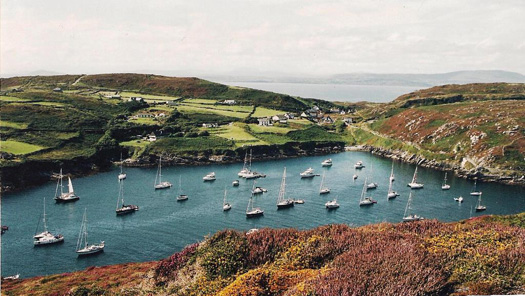
South Harbour on Cape Clear on a busy day
But sailing cannot and should not be dependent exclusively on racing and for the next few weeks the annual trek to West Cork beckons sailors from many parts. As one matures, gets older some would say and the joints do not bend or flex as easily as they did in years past, cramped conditions aboard cruiser/racers can be challenging. But there is the counterbalance of the enjoyment of leisurely time in places like South Harbour, Cape Clear, which is one of my ideal locations; at Sherkin Island, Baltimore, Schull and other places. Glandore is quieter these days than inprevious years for visitors, with the village hotel and the Glandore Inn, which had been sailors' main location on arrival in the village closed. The hotel is up for sale. Other pubs in the village are open and Glandore Harbour Yacht Club has its own clubhouse now. There are sunsets and sunrises to be discovered, early morning sailing in quiet areas and the enjoyments of cruising without time disciplines. [Read WM Nixon's recent sailing blog on West Cork]
WHAT A SHARK PICTURE!
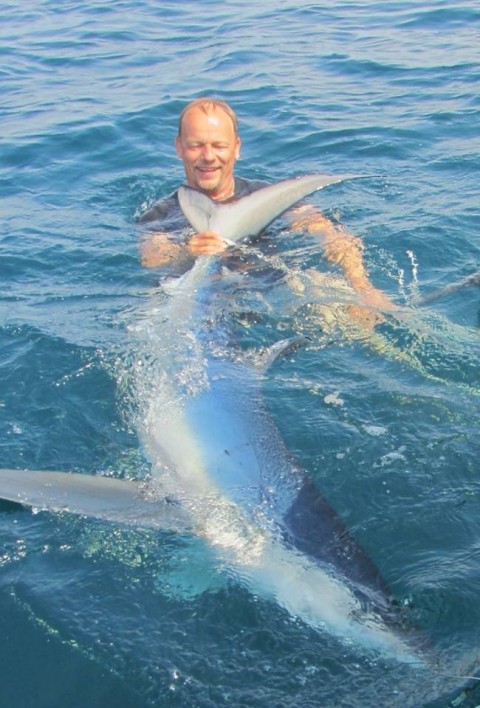
Nice catch!
This is some photograph, of an angler in the water with a blue shark. Paul Bourke, Angling Information Officer with Inland Fisheries Ireland explained to me: "Jim Clohessy was out with some Norwegian anglers last week fishing from boats in the Bellavista fleet in Cork Harbour. Amongst this intrepid crew was Hans Olav Hagerup, an angling guide himself. Hans explained to Jim how his anglers, fish, catch and release for big halibut and as these fish are too big to get in the boat for a photo, the anglers get in the water instead. Little did Jim know what this would lead to when Hans had his first Irish blue from a small boat and jumped in the water! He won the Fisheries Ireland Catch of the Week for this one!
NEXT THIS ISLAND NATION RADIO PROGRAMME HERE ON AFLOAT: August 7.
#tallship – The first Bantry Longboat ever built in the Midlands will go sailing on the Shannon at Banagher in County Offaly. It will be some sight when it does, bringing involvement with the Atlantic Challenge which organises international competition of these boats, to what can fairly be described as Ireland's greatest river system.
If that major event should itself be held in future years on the Shannon, what a great occasion it would be.
I met some of those who built it the Banagher Longboat at the Glandore Classic Boats Summer Maritime School where one of them, Noel Ryan, told me that it took 5,036 man hours. Another of the group, Willie Kirwan, added that they would have "done it quicker if we were tradesmen, but we were all learners without experience, so we had a lot of tea breaks! If we were tradesmen we would have been quicker, but we enjoyed it and we have a fine boat."
They have indeed and those who built it will be testing it out in August. "We want to make sure it goes well, we wouldn't want any embarrassment," said Willie jovially, "but we are sure it won't sink, though we will have to learn about the skill of rowing and sailing this boat."
Indeed they will. I had the pleasure of sailing in the Bantry Longboat which was built in Bantry a few years ago. When it sailed on a reach it could reach a pretty quick speed and I found it was the skill of the crew in balancing the boat which kept it upright. You needed to be lively, as the longboat doesn't have a keel.
"We learned a lot, new things every day, building a boat can be tough and demanding but it is definitely enjoyable and rewarding when you see it finished," Noel said.
They have a lot of pride in their boat which was built with as the West Offaly Bantry Bay Longboat Project, originally a Men's Shed initiative with support from Offaly Local Enterprise Development Company, West Offaly Enterprise and County Offaly VEC, the latter of whom apparently thought the job might be done in three months!
The boat has led to the formation of the Midlands Atlantic Challenge Club, which intends to organise involvement with schools, youth, sports and corporate groups.
Twelve countries are members of the Atlantic Challenge organisation – Belgium, Canada, Denmark, Finland, France, Great Britain, Indonesia, Italy, Russia, USA, Ireland and Northern Ireland are separate members.
The original longboat, also known as an admiral's barge, was built in Brest, France, over 200 years ago. The boat is similar to the Captain's gigs used at that time by the navies of France, Sweden, Russia, Spain, Sweden and the USA. When the French Armada arrived off the South/West coast of Ireland in 1796 it ran into a gale and, through lack of leadership, decided to return to France. But the longboat from the vessel which Wolfe Tone was aboard, while trying to establish communication with other ships, was blown ashore in Bere Island and the crew were captured by British forces. This boat is preserved in the National Museum at Collins Barracks in Dublin. Built in1790, it is the oldest surviving vessel of the French Navy.
So, what have these Bantry Longboats got to do with whether Ireland should have a tall ship?
Hal Sisk, legendary figure in the traditional boats sphere and a man never reluctant to take and express a different view and to advance that, even if controversial, was also speaking at the Glandore Summer School in his role as sailor, author and yachting historian, on the topic: 'The origins of the sport of modern amateur sailing.'
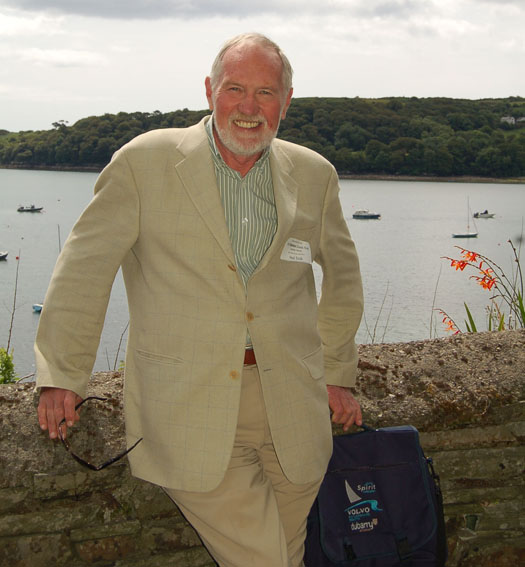
Hal Sisk
Hal advanced a different view about the thrust of sail training than Ireland having a tall ship for the purpose:
"To get people out on the water, in a team concept, providing physical exercise and with international competition, all of that could be achieved with an alternative of a fleet of 30 Bantry Longboats, several of which have already been built in Ireland. There are 35 worldwide and a fleet of them in Ireland would provide, at dramatically reduced cost, what a sail training ship delivers in sail training."
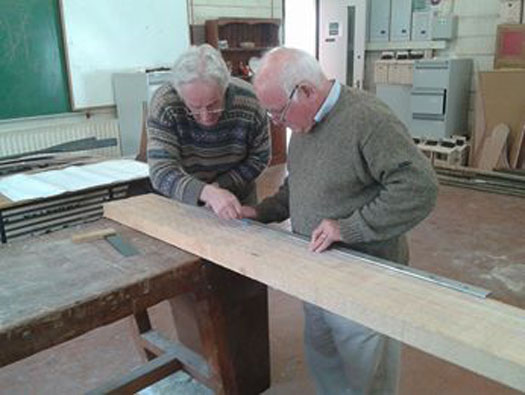
Building The Banagher Bantry Longboat
I put it to him that this would exclude the role of international representation which, for example Asgard had done well and, in modern terms, requirements to provide for disabled trainees.
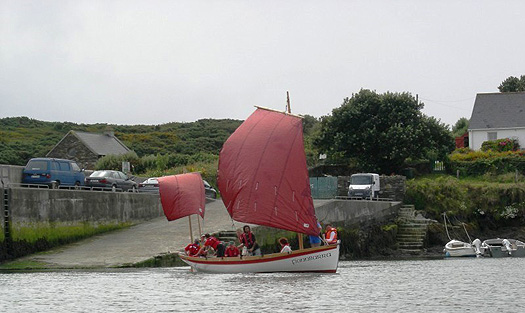
Bantry Longboat Fionbarra
"I acknowledge what you say, but these boats have fantastic international competition. They are all built the same wherever they are, whereas in the race of sail training ships, it is pretty much based on handicap, it is not a race between identical boats. The Bantry longboats provide this, they come together every few years in international competition and have been built far away, in Indonesia, Russia, for example. You would get true, fair, international competition. They don't fly the flag in a spectacular way in international representation terms as Asgard did for example or as does a beautiful square-rigged tall ship, but there always was an alternative in the replacement of Asgard after she sank.
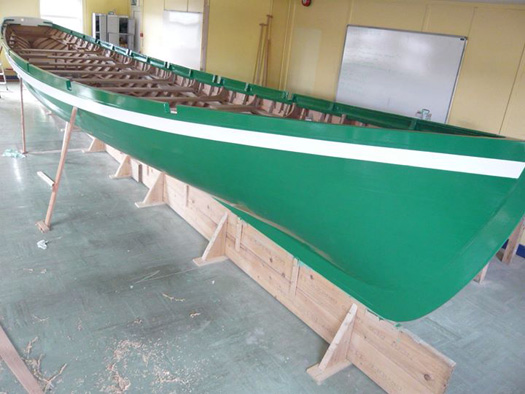
The Banagher Bantry Longboat
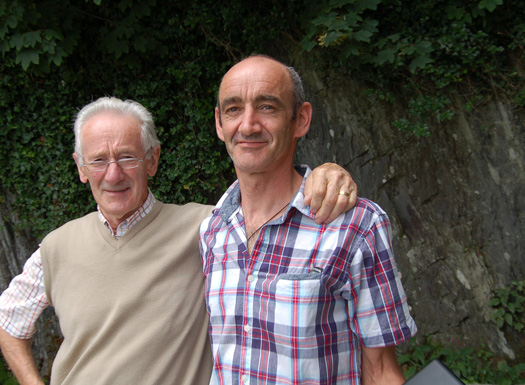
Willie Kirwan And Noel Ryan - Banagher Boat Builders
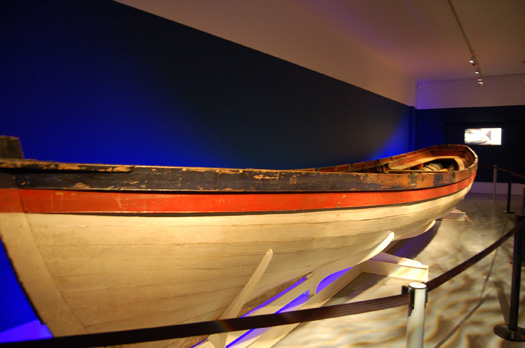
The Oldest Vessel Of The French Navy - The Original Bantry Longboat In Ireland's National Museum
"Ireland could have bought a steel-hulled topsail schooner for about €2m, or so and have her for that function, but I would argue that, as against the building of a new tall ship we could build a fleet of Bantry Longboats. We must also remember the cost of maintenance and operation of a tall ship, crewing and health and safety requirements. But a fleet of Bantry longboats would be out on the water far more often probably and could be built for maybe a million and would provide more use for more trainees and the cost, against that of a sail training ship, would not be just very much less, but substantially less by my calculations."
Hal has sent me statistics to make his point - that actual use and benefits in providing sail training and general seamanship for many more young people would be at much less cost for a fleet of 30 Bantry Longboats compared to a tall ship and would be of much greater benefit.
"Bantry Longboats could be spread around the country, built locally and therefore also building on town and parish pride and maintaining coastal traditions also. It is a historic boat, authentic, distinctive, with that huge international competition dimension."
The case Hal Sisk makes is interesting, while at present efforts continue through what was formerly called the 'Pride of Ireland Trust' now changed to the 'Atlantic Youth Trust,' to build a new Irish tall ship, the concept design for which has been completed. The name change followed consultation on both sides of the Border, after which it was decided that 'Pride of Ireland Trust' did not represent the views of all stakeholders and "therefore did not represent the ethos of the organisation, so in order to create a name that has a true sense of neutrality, a strong maritime focus, a sense of adventure and one that carries weight in America, 'Atlantic Youth Trust,' was chosen as the name to offer unique Youth and Cultural Development opportunities, to help the island reach its maritime potential and to create a flagship that will represent the island on an international platform," amongst other aims.
I will be interested to hear response to the views of Hal Sisk.
THE GOVERNMENT IS HOLDING €3.8m. IN ASGARD COMPENSATION WHICH IT SHOULD RETURN TO THE MARINE SECTOR
It remains a blot on the maritime reputation of this island nation that the €3.8m. insurance paid for the loss of Asgard was put into general Government funds by former Defence Minister Willie O'Dea, rather than being held for the specific purpose of a replacement national tall ship, even if that would be provided outside of Government.
I was never impressed by the administration of Asgard during my years as a national marine correspondent. I expected far more commitment and determination in support of the maritime interests of this nation. When Willie O'Dea appeared to confuse 'vehicle' and 'vessel' in his answers on a radio interview about the sinking of Asgard, then refused several attempts by me to get an interview with him about his decision in regard to giving the Asgard insurance money to the State and other decisions he made when the equestrian requests of the Army for horses, were considered more important than Asgard, I realised that the Limerickman who declares on his website - 'Working for You' - did not show much commitment to working for the national tall ship. I offered to go anywhere, anytime, to interview him, but through his officials, he always found a reason not to be available.
Whether for Bantry Longboats or for a tall ship, it is my view that there is €3.8m. in State funds which is morally due to either project and the Government should acknowledge and provide that.
No less is required of the Government of an island nation.
Maritime Ireland Deserves a Tall Ship
#tallship – You come across a reference to an island nation - the 20th largest in the world - that doesn't have a marine policy or a dedicated marine department, and you think it must be some kind of a joke. It's a ship of state without a captain, or a rudder. It adds insult to injury to discover that this same island nation was moved to the verge of bankruptcy after her inhabitants turned their backs on the ocean and invested too heavily in the land.
So much for living in a smart economy.
Not many people living in Ireland realise that it's the third biggest country in Europe, by virtue of her seabed territory of 220 million acres.
Ask any fisherman what EU membership did for our trawler fleet and you will get a quick answer. Ireland has two–thirds of European fishing waters and 3 per cent of the catch. That sell-out, as the fishing community saw it, was the beginning of the end of marine policy in Ireland.
We have in the past been able to blame a lot of our maritime ignorance on the British, with a little justification. Boat ownership by the 'native Irish' was restricted at times, and fishing permitted only by licence. But that was 400 years ago, so we're running out of excuses.
If you're searching for a recent symbol of this marine neglect, look no further than Asgard II. At 30 years old, the boat was at the end of her working life when she sank off the coast of France in 2008.
She was our maritime flagship, a national icon which had given 10,000 young people the chance to go to sea. The insurance money paid out and it went into central exchequer funds. The State showed no interest in replacing her. Until now perhaps?
There has been some sort of maritime awakening in official Ireland. In June, the Government hosted an Ocean Wealth conference declaring millions could be 'harnessed' from our seas in so many ways.
Separately, a new naval patrol vessel has arrived at a cost of E54m. Another one is expected next year. This month the Taoiseach announced he'd ordered a third.
Is it all coincidence or is Ireland moving towards a new marine game plan?
There's no doubting the public's interest in our seas.Just look at the interest in the maritime festivals around our coast this summer and the crowds that came to see Spain's 'Juan Sebastián de Elcano', the world's third largest Tall Ship in Dublin port in June.
Now there is fresh State impetus in the marine, there should in tandem be plans to replace Ireland's Tall Ship, a symbol of our maritime heritage and the possibilities offered in the seas that surround us.
#thisilandnation – There are 11 different storylines in this month's THIS ISLAND NATION programme here on the Afloat website, underlining the wide variety of maritime topics to be reported. They range from an exclusive interview with the head of the Sea Fisheries Protection Authority, the regulatory body for the fishing industry, to a reminder about Rosslare's involvement with the first use of Morse Code on a lifeboat in Ireland.
As well as those items Stephen Newton, Senior Conservation Officer for Seabirds with Birdwatch Ireland, discusses the importance of the observation of the rare Bermuda Petrel species off the Irish coast for the first time; an artist from a fishing family at Roche's Point in Cork Harbour describes how the sea inspires her painting; a former Coast Guard describes how he will be Ireland's only representative at the World Town Crier Competition; there is a reminder of how tough life was for dockers in Dublin Port; the €4m. export value of an Irish sea worm is reported and a man from the Waterford Estuary calls on maritime communities to follow his example in preserving traditional maritime artefacts.
Dunmore East fishery
The RNLI provides a regular monthly report, as do the Commissioners of Irish Lights who describe changes at Inisheer Lighthouse on the Aran Islands and the Chief Executive of Irish Water Safety emphasises the importance of teaching children how to swim. The national media does not give enough coverage to the marine sphere, but Afloat.ie and THIS ISLAND NATION do.
FISHERMEN WHO 'LOSE THE RUN OF THEMSELVES' WILL BE PROSECUTED
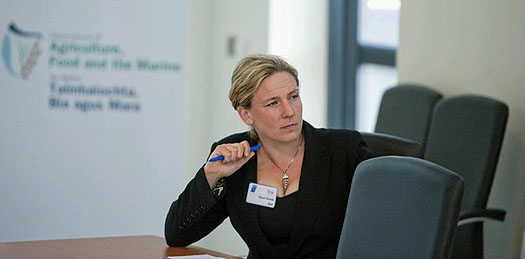
Susan Steele, IFPA
The Head of the Sea Fisheries Protection Authority wants to see "a thriving fishing industry and thriving fishing communities," but says that those who "lose the run of themselves" and engage in illegal fishing will be prosecuted. Susan Steele is Chair of the SFPA, effectively the senior executive and in an exclusive interview with THIS ISLAND NATION says she wants the fishing industry to understand that that the SFPA will always act fairly and with transparency. "The Authority's task is to do a good job for Ireland's marine communities to help ensure that they survive and thrive. As well as working closely with the industry with which we have a fantastic relationship, there are times when the SFPA has to carry out "enforcement actions to ensure that "those who lose the run of themselves are dealt with," she says.
A DIFFERENT WAY OF MIGRATION
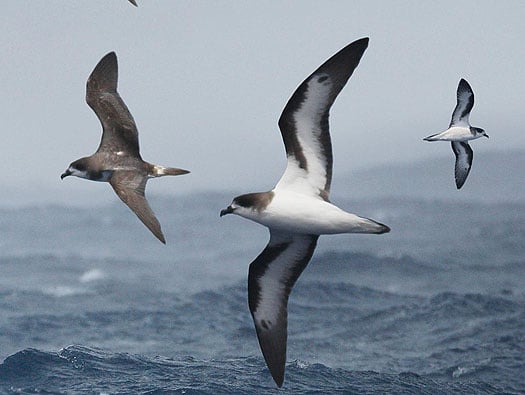
Bermuda Petrel – back off Ireland in search of food
The arrival of a Bermuda Petrel, a very rare species the future of which is under threat, off the Irish coast has caused considerable interest. Stephen Newton of Birdwatch Ireland indicates that this could be because of following fish for food. He also has an interesting insight as to why the Bermuda Petrel might be migrating the wrong way around.
A CENTURY AT VALENTIA
Valentia Island Lifeboat Station in County Kerry has been presented with a 100th anniversary Vellum. Last year the lifeboat there launched 33 times and saved 33 people. Niamh Stephenson from the RNLI has this and more lifeboat news on THIS ISLAND NATION.
INISHEER LIGHT CHANGES
The Commissioners of Irish Lights have made changes to the light displayed from Inisheer Lighthouse in the Aran Islands, introducing a LED (light emitting diode) which will be more energy efficient. Rory McGee, Engineering Operations Manager at CIL, reports the change on THIS ISLAND NATION.
DUBLIN DOCKERS
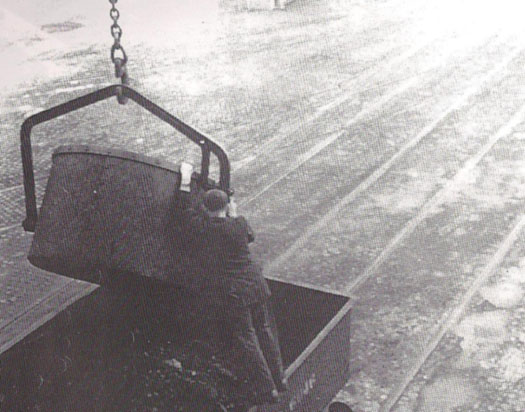
I referred in my last blog to the 'Songs of the North Lotts' about the communities living around the Dublin Port area and the collection of forty evocative songs by Paul O'Brien. There was considerable interest, so this month on THIS ISLAND NATION I am playing another of Paul's songs. This time he sings about the dockers who unloaded the ships and how they had to line up and hope to be chosen for a day's tough work.
VALUABLE SEA WORM
A sea worm that is worth €4m. is the description of the whelk which Sea Fisheries Protection Officer Liam Kennedy tells me about on the programme. They rarely make an appearance on Irish menus, but this large sea snail is highly prized in the Far East including: South Korea, Hong Kong, Japan, China and Singapore. The whelk fishery is important to smaller inshore vessels. Because whelks are susceptible to over-fishing, he is asking fishermen to "be responsible and not land undersized whelks."
COSTA SCRAPPING
The Costa Concordia is to be scrapped at Genoa in Italy to where it will be towed on July 20, according to latest information about the dismantling of this ill-fated cruise ship on which 32 people died when it hit rocks off Tuscany in 2012. An Italian consortium has been chosen for the demolition work over other bids which were made from France, UK, Norway, Turkey and China. Italian Government approval has yet to be given for the scrapping.
SPREADING THE WORD
I'm pleased with the number of people contacting me with opinions, news and views, since this programme and blog was launched. Your comments are always welcome.
Email: [email protected] or [email protected]
THIS ISLAND NATION AWARD
The national association of community broadcasting stations, CRAOL, at its annual conference presented the award for scheduled programmes to THIS ISLAND NATION maritime programme, produced at and presented from Community Radio Youghal, Co. Cork. Photo shows l. to r. Justin Maher, Station Development Officer, cry104fm Community Radio Youghal; Tom MacSweeney, Presenter; Declan Gibbons, Station Manager.
Twitter: @TomMacSweeney @Afloatmagazine
#thisislandnation – After an absence of several years it is a pleasure to return to the airwaves, a decision I have taken in pursuance of my belief that the national media is seriously neglectful of maritime matters. The marine sphere is not adequately served by the national media, print or broadcast. The specialist media such as AFLOAT and community radio offers an alternative voice, so do social media outlets.
THIS ISLAND NATION is a monthly hour-long radio programme of which the first edition available here on Afloat.ie highlights the decay forced upon coastal communities by government and EU policies.
Sean Doherty, who I interviewed for my programme at the 'EMPOWERING COASTAL COMMUNITIES' Conference in County Waterford, is a man who is trying to preserve his local community at Cheekpoint on the Waterford Estuary. He describes how the ending of the drift net fishery, followed by the closure of the eel fishery, has contributed to what he sees as the destruction of his community. Men earned a living from the fisheries for their families, others were employed to maintain engines on the boats, more had work repairing the fishing boats and local restaurants served their catches as local produce. But these aspects of life in Cheekpoint no longer exist. The village has suffered heavily. His interview indicates how decisions were made by politicians and State administrators without carrying out any examination of the social effects and the damage they would cause to the communities affected. Those communities were treated with disregard and what amounts to contempt for their future. It is a sombre story.
The oceans are, in places, a wilderness, sweeping the globe and washing the edges of our cities. They provide opportunity and potential. The coastal communities are the first interface of Ireland with the sea at the coastal rim of this island nation.
So why is it that the sea is not regarded as a priority national interest?
The answer lies in a failure of political and economic perception, fuelled by an adherence to globalisation rather than pride in being an island nation.
Ireland is the most western island nation in Europe, but there is no pride evident in Government circles that we Irish are islanders. At the highest level of political life and civil service administration, as well as amongst the national media and the general public, there is a failure of perception to realise that being islanders gives Irish people an unique place in Europe. The concept of globalisation, which policies favour, is the destruction of uniqueness.
As Sean Doherty says in the interview, there are publicly expressed concerns and movements calling for the protection of indigenous communities around the world; and for the promotion of multi-culturalism in Ireland; but there is little or no interest and no movements for the preservation of the indigenous people of Ireland –the coastal and fishing communities.
The voice of the sea can speak to the soul, that voice should be heard by those who make the decisions which affect Ireland.
While there are some positive steps, which are also outlined in the programme - THIS ISLAND NATION - which you can hear on this website, these are not enough to counterbalance neglect of the maritime sphere. More is needed.
Cheekpoint nestles in the Waterford Estuary near where the Rivers Suir and Barrow meet, lying beneath Minaun Hill and has a magnificent, panoramic view across Waterford Harbour.
Sean Doherty described himself to me as an angry, frustrated man at what he sees as he looks out from his home on the estuary, "because what I am seeing is destruction caused by a form of blindness."
The Prong is the local boat which has been used by fishermen from the village. The first one built in many years is pictured below, together with an example of an older boat. The coastal communities are endeavouring to maintain their maritime heritage. So should the nation.
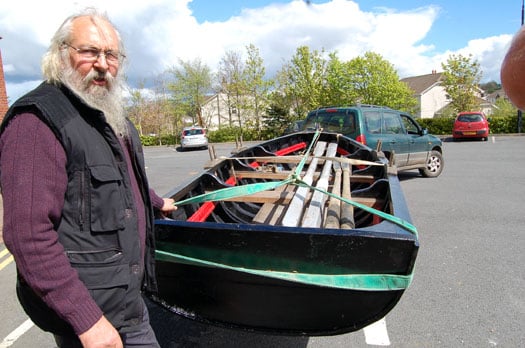
Above John Gossip with the new Cheekpoint Prong and below an older example of the craft
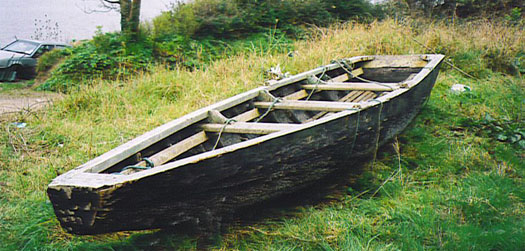
Twitter: @TomMacSweeney
This Island Nation Podcast – Waterford Estuary Fishermen, Ocean to City Rowing & More...
#islandnation – Welcome to the new monthly 'This Island Nation' radio programme on Community Radio Youghal, Cry104fm and podcast on Afloat.ie, Ireland's boating website. Click the play button above to hear the podcast.
In this month's programme Marine Journalist Tom MacSweeney is told by the fishermen of the Waterford Estuary village of Cheekpoint how they suffered when fishermen were stopped from fishing by Government decision. The programme hears the music of the North Lotts from Dublin, is told by a Cork City official why Cork City Council made the River Lee cleaner than the Liffey and Tom tries to record the famous Kittiwake colony in Dunmore East.
With news about the biggest Ocean to City rowing race in Ireland and a round-up of national and international news, this is the programme for everyone interested in the maritime sphere.
What Does the ISA Do for Me, as a Club Member?
On THIS ISLAND NATION this week... I take the view that every sport needs a national association to lead its development. So Ireland needs a national sailing association. How a national association serves its members must be the definition of its success. A national sport can also benefit from the oxygen of international competition, offering opportunities to raise the national reputation and the team and/or individual involved. The representative organisation must not lose touch with its base, the local club, the local member. Is there a dichotomy in this regard between the drive for international success and the state of sailing in Ireland?
Next Saturday's planned meeting in the National Yacht Club in Dun Laoghaire, following on the raising of issues about the development, future and existing state of sailing in Ireland at the annual general meeting of the Irish Sailing Association (ISA), has a lot to discuss.
The national sailing authority has been challenged on several fronts, ranging from whether the drive for international success has neglected the sport locally, to its administration, whether the ISA was correct to embrace motorboating power within its remit and other aspects of the state of sailing in Ireland today.
I have an open mind on the issues raised, but the challenges issued must be answered, one of which appears to be the relationship of the ISA to the local club member, which has been the subject of debate.
"What does the ISA do for me, as a club member?"
How often I have heard that question raised and also the answers given – amongst them that, without it, there could not be national championships; would not be international recognition of Ireland; matters of regulations; issuing of certificates and many others, as well as criticism that the ISA has moved too far from its base and become involved in matters extraneous to the sport of sailing.
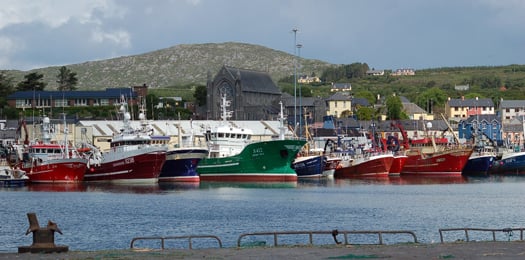
Bring back buying fish locally
WHAT'S THE CATCH?
"This country is sodden with regulations" a comment I have heard quite often and which has a degree of truth. In the course of the present food controversy over horsemeat I remembered the days when it was possible in a fishing port to buy fresh fish off the boats as the landed. Regulations imposed by the omnipresent "health and safety," often seen as an abuser of freedoms, has prevented that opportunity, to which one can hearken, particularly in these times of industrial-food operations which have led to the horsemeat issue.
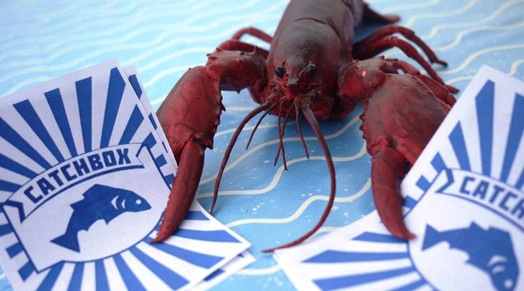
Catchbox
On Wednesday of next week, March 27, a "community-supported fishery" project is to be launched at Brighton in the UK. "Catchbox" is the first project of its kind, intended to provide local fish at a fair price to both fishermen and consumers, ensuring a sustainable market for a variety of local fish. Members of the scheme pay a fee to join the project at the beginning of the fishing season and are entitled to a share of participating fishermen's catches each week, based on a set weight. Local restaurants, fish shops, cafes and domestic consumers are entitled. Members will also get together for cookery demonstrations. The idea comes from North America where community-supported fishery schemes are popular. Could they spread so that we could get back to the days of local people being able to buy locally-caught fish rather than the present industrial-type food system which has produced situations such as the horsemeat controversy?
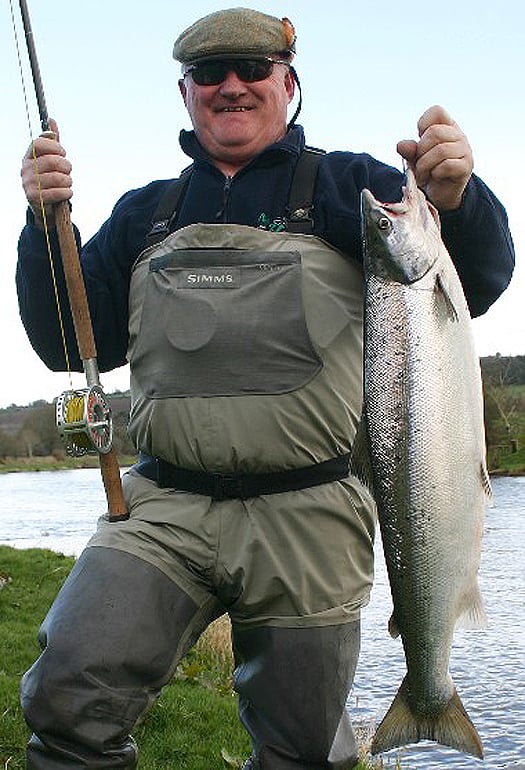
Salmon on the Blackwater - a catch by Terry O'Keeffe from Midleton
SALMON RISING ON RIVER BLACKWATER
Ian Powell of Blackwater Lodge down South in the Cork/Waterford border areas is in happy mood this week after some good catches of salmon, amongst them the one pictured here which Terry O'Keeffe from Midleton caught. Ian describes the catch: "Terry came to the Lodge at about 2.30 p.m. I sent him to Kilmurry. At 4 o'clock I had a call from him to say he too had a springer on fly after only an hour fishing. (Another angler had also taken a good catch earlier in the day.) I grabbed the camera and headed for the scene - the Hut Pool on Upper Kilmurry. Duly photographed, I brought the fish back to the Lodge where it tipped the scales at 10.3lbs. Terry's fish fell to a fly of his own tying fished on a Sink 1/2 Loop Custom Shooting Head made by Glenda. Both fish were extremely fresh but neither had sea-lice which could well mean that fish are moving through only very slowly and that there are probably a reasonable number about."
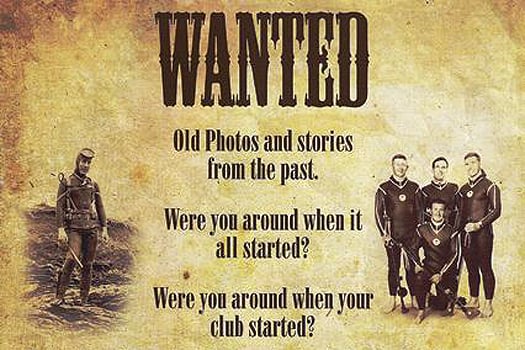
FIFTY YEARS OF DIVING
CFT, the Irish Underwater Council, is to make its 50th anniversary this year with a celebration dinner at the City North Hotel, Gormanston, Co, Meath, on September 15, which will also be the publication date of a special newspaper chronicling the history of the national diving association around the country. All clubs are being asked to provide "pictures and stories and we are also looking for old video or cine-camera footage covering any diving event."
Contact CFT at 78a Patrick Street, Dun Laoghaire, Co.Dublin – phone 01 2844601 or Email: [email protected] if you can help.
CRUISE LINES PROSPER DESPITE TROUBLES
Despite fears of a downturn after the Costa Concordia disaster the cruise ship industry has shrugged off bad publicity, dealt with the imposition of new regulations and survived a weak world economic situation to continue making profits. That is according to the Florida, USA-based Cruise Line Industry Association which has set-up a "one worldwide voice" for the industry. The United Nations' body for safety at sea, the International Maritime Organisation, is to implement a unified policy for lifeboat muster drills for passengers, but that may not come into effect until the middle of next year.
CLIMATE THREAT TO SEWAGE!
Sewage in the water is not pleasant and in the USA where issues can take peculiar turns, environmentalists are objecting in Miami to plans which the local authorities say are vital to impose because of fears that climate change could drastically affect sewage treatment plants in Miami in southern Florida. Scientists there have warned that the three major sewage plants serving the area could be "reduced to shrinking islands in less than 50 years" due to rising sea levels which will threaten the region's vital facilities. As a result local authorities have announced a $1.5 billion plan to improve protection of the existing plants. However the main objectors are environmentalists who want the plans moved inland, but residents in suggested alternative locations are in turn objecting to that!
Email: [email protected]
For regular Marine News follow on Twitter: @afloatmagazine @TomMacSweeney
How Government Misled Maritime Public, Respect for the ISA & the Unluckiest Ships' Captain?
#islandnation – On THIS ISLAND NATION this week... How the Government has misled the maritime public ... The unluckiest Ships' Captain? ..... What about this collision in Singapore! Have you checked your marina's ladders? And much more...
Government reform to make its administration more efficient and supportive of the maritime sector is urgently needed. It is time that political parties are required to deliver on the promises they make when seeking election. They have been allowed to mislead the public for too long in this regard. This is what Fine Gael promised in its General Election Manifesto under the heading "Steering the Marine":
Marine Department
Marine and fisheries policy is currently spread across three Departments. Fine Gael will merge these responsibilities under one Department for better co-ordination in policy delivery
But the number of Departments across which the marine is spread has increased to five since Fine Gael and Labour took over Government. There are five Ministers and a similar number of Ministers of State with have responsibility for aspects of the maritime sphere. When they concluded a pact for Government, Fine Gael and Labour indicated that it was their agreed view that maritime matters should be brought under just one Department. Surprise, surprise, where political promises are concerned, this was not implemented. Instead the situation has worsened.
How can the Government be so blind to the potential of the maritime sector? Would this not make you wonder about how efficient it is in protecting the interests of this nation in development of our offshore resources?
HAVE YOU CHECKED YOUR MARINA'S LADDERS?
The wife of a friend of mine slipped between their boat and a marina in going ashore and fell in the water. There was no marina ladder anywhere in the vicinity and he had to get help from others on the marina to pull her out and onto the marina. Shocked by what had happened he walked the entire marina and could not find a single safety ladder which would help recovery in such an emergency. This marina is in Ireland, he told me. Have you checked your marina?
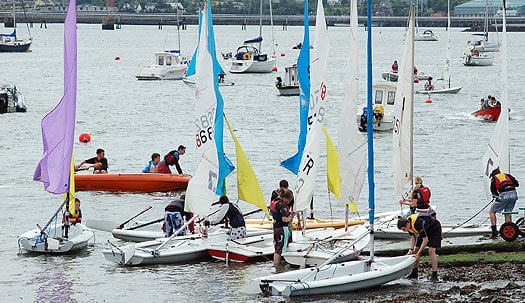
Youth dinghy sailing
RESPECT FOR THE ISA
"A national sailing authority must command the respect of those it serves to do its job efficiently. If it doesn't, it can't." That comment is one of several I have received since the future of dinghy sailing was discussed at the annual general meeting of the Irish Sailing Association. "A long, slow decline in the sport which has, as its root cause, bad policy decisions taken at ISA level," is a serious accusation, carried in reports from the meeting, another aspect of which struck me was that there were just 80 delegates reported present. That number does not strike me as strong representation of sailing clubs around the country.
In recent years it has been comfortable to be told that sailing was expanding rapidly and I have seen more youngsters taking part, but what was raised at the ISA a.g.m. does cause concern: "We need face some realities. It's always dangerous when an organisation starts believing its own public relations." That is another quote I have seen from the meeting. I was out of the country when it took place. A challenge has also been raised by Norman Lee from Wicklow and Bryan Armstrong from Sligo about the inclusion of "power" in the 2006 amendment to the ISA's objectives: "Is it a coincidence that what we see as the rot started around 2006? We make no apology for our interest in the sport of sailing meaning boats powered by the wind and this is what we want the ISA to refocus on."
The ISA has been directly and seriously challenged. It is up to the Association to earn the respect of the sailing public.
UNLUCKY OR CARELESS CAPTAIN?
The most unlucky Ship's Captain about whom I have heard is named Captain Rochfort who commanded two ships which went on the rocks in two months!
Both were steamships and seem to have been pretty close to shore when they hit rocks. The first, the iron paddle steamer Minerva, had a hundred passengers and twenty-two crew aboard and was reported at full speed on the evening of August 29, 1854 en route from Liverpool to Cork but too close to the rocky islands known as the Skerries off Anglesey in Wales. Captain Rochfort ordered a change of course but the vessel struck the Victoria Rocks, took water and began sinking. All aboard got off safely. In subsequent reports, the Captain was praised for his actions as the ship was abandoned.
However the attitude towards him changed two months later when he came under severe criticism and investigations were demanded into his handling of the Ajax, an 800-ton paddle steamer with 400 h.p. engines. She had 300 people aboard en route from London and was also sailing too close to the shore. She struck "well-charted rocks" near Plymouth. Other ships came to the rescue and all aboard were saved.
The two shipwrecks were a disastrous period for the Cork Steam Ship Company which operated services from Liverpool and London. This intriguing story is told by Ronnie Herlihy in his book, 'Tales from Victorian Cork.' The company offices can still be seen on Penrose Quay in the city.
NOW WHAT ABOUT THIS EXAMPLE OF COMMAND?
Having read about Captain Rochfort, I saw this example of command (above) which happened on March 3 in the Straits of Singapore, a very busy transit point for shipping, when a smaller vessel began going to port and getting closer and closer to a bulk carrier. Listen to the audio on the bridge of another ship as the incident was filmed and, despite all the warning soundings of hooters and horns, a collision occurred. The Singapore Coastguard reported that there were no casualties, but there was serious damage to the smaller ship. Investigations are continuing.
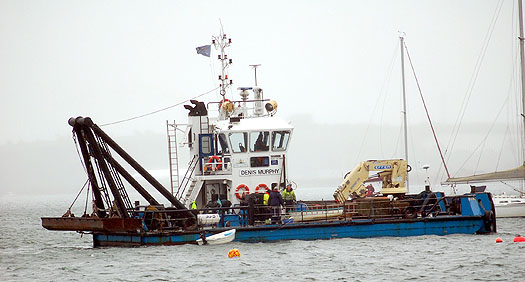
Cork Port vessel inspects mooring buoys
MIND YOUR CORK BUOYS!
If you own a mooring in Cork Harbour take careful note that from this Monday, March 11, Cork Port Company intends to begin removing all "unauthorised, unpaid or illegibly marked moorings". It seems a bit early to be doing this as many leisure boat people don't become active until April/May and some not until June. I put this to the Port Company which responded: "The routine of checking moorings has always been undertaken during this time of year by our staff, but also continues during the season. As you pointed out, it may seem early in the season, however, we find the most suitable time to undertake this activity is when unauthorised moorings are free of boats. We note from past surveys that genuinely responsible mooring holders keep a regular check on their mooring throughout the year."
So, you have been warned!
DUNMORE EAST RNLI CHANGE
In Dunmore East, County Waterford, Michael Griffin has taken over from Joefy Murphy who retired as Coxswain of the local lifeboat after 14 years in the position during which he was involved in many emergency services. Joefy had been on the lifeboat crew since 1997, a great record.
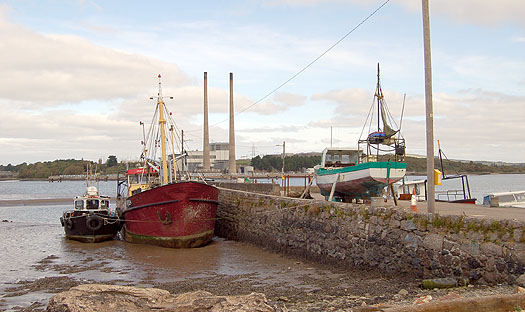
Cheekpoint pier
WATERFORD ESTUARY FISHING DECISION NEEDED
Fishermen in the Waterford Estuary who decided not to take compensation but to hold onto their traditional drift net salmon licences have suggested that salmon stocks in the Nore, Suir and Barrow, which feed the estuary have recovered enough to allow access to their traditional fishery at Passage East, Cheekpoint, Dunmore East, Ballyhack, Duncannon and Arthurstown. The economic and social effects of the banning of drift net fishing on fishing communities in these areas has not been adequately examined.
Email: [email protected]
For regular Marine News follow on Twitter: @Afloatmagazine and @TomMacSweeney
#islandnation – This week...Steamship history from a small town in Cork Harbour...Coastal areas deserve State support for development projects to create jobs...Ice on the river...Grant Dalton blows his cool on America's Cup hypocrisy... Indian sharks have gone missing and more...
Passage West is a town with a great maritime tradition on the edge of Cork Harbour, so what could be more natural than revival of its fortunes coming from the River Lee which caresses its shoreline on the way to the sea? The town has suffered quite a bit from the economic downturn and areas of it look decayed these days, but there is no decay in the memory of the connection of this town with maritime history. It would be fitting were it to become one of the main locations for this year's Gathering events when the 175th anniversary of the first steamship crossing of the Atlantic is commemorated because it was from this town that the crossing started when the ship, Sirius, was commanded by a local mariner.
These days there is still a shipping berth operated in the town off which sailing vessels once transferred cargoes into lighters to carry the loads upriver to Cork City. Much of the maritime hardware, the dockyard and other ancillary facilities have disappeared into the shrouds of time.
Occasionally the town is confused with Passage East on the River Suir in Waterford. Once Passage West had a small ferry operation serving the workforce across the river at what was then the big NET Marino Point State fertiliser factory. Perhaps appropriately, at the steps where that ferry landed onto Railway Quay and where once a railway operated, the Passage to Monkstown River Users' Association has proposed using a block and chain mooring system to locate a pontoon and access gangway 20 metres out from the shore that would be usable at all stages of the tide without requiring dredging. The Associations is an example of an active, local community wanting to use the maritime history and resources of an area to provide economic development in these difficult times. There are several such-minded communities around the coast. What they need is more State and local authority backing and practical financial support. Investment in maritime projects will be a key to the future.
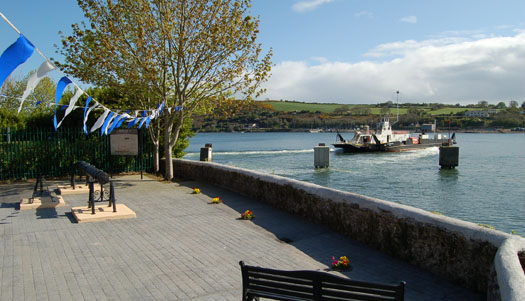
Sirius commemorative site in Cork
"With the development of Spike Island and Fort Camden and more realisation of the value of Cork Harbour's amenities, there is still not enough access to the river. What we want to do is change that, without costing a great lot of money," they told me. As part of this they will hold a week-long Maritime Festival starting on May 17 to mark the 175th anniversary of the of the Sirius voyage from Passage West to New York in 1838, the first ship to cross the Atlantic under steam power. She was commanded by Lieut.Richard Roberts a native of Passage West. It will be a fitting part of this year's national 'Gathering' Project and include a maritime exhibition, water-based activities, rowing and yacht races, safety and rescue demonstrations, a historical exhibition about the Cork/Blackrock to Passage West Railway and onshore events.

Sirius
Passage West Town Councillor Angela Murphy, a member of the Organising Committee, says they are seeking exhibits – historical documents, photographs, craftsmen's tools, items associated with the railway, ship building/repair memorabilia, ship models for the exhibition "all of which will be safely returned."
Further information from 087 1357634 or Email: [email protected]
YOU WON'T FACE THIS IN IRELAND!
Walking along the riverside in Fredrikstad, a port city about two hours south of Oslo in Norway at the weekend, not far from Swedish waters, I enjoyed the sunshine and heard locals say that Spring was coming and soon the covers would be taken off the boats moored along the river and leisure sailing would begin again.
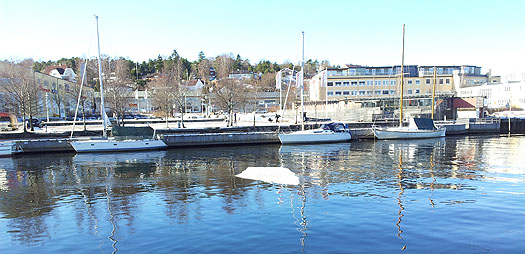
Ice on the tide
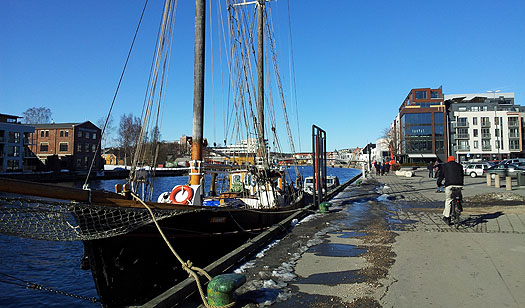
Norwegian riverside sailing history
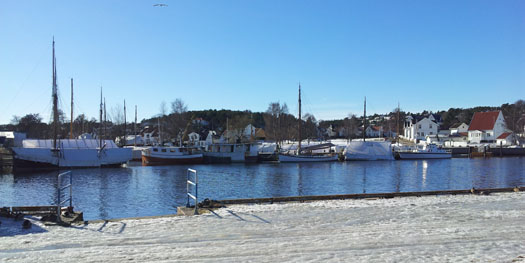
Winter river moorings in Fredrikstad
A boardwalk leading onto a paved area, with seating, restaurants and bars, even a theatre and a free cross-river ferry to the older, historic fort area of the city which once protected the waterway, all underline how Norwegians value their maritime resources. While moored, covered leisure craft are not used in winter, there is still essential river commercial traffic, while all around the Norwegian coastline boats are a more essential part of transport than cars. From across the river at Fredrikstad I could hear the sound of work emanating from boatyards and reminded myself than once I got home it would be time to begin my own plan for getting the boat ready! Along the riverside historic vessels mingled with the modern. A lovely place to walk, to muse, to enjoy. What a pity we do not have similar city-based attractions in this country.
One aspect of maritime life in Norway that is not likely to be experienced here is the sight of ice floating down the river! Even as Spring approaches - and they do have clear weather seasons in Norway – upriver areas were still frozen over.
BIOLOGISTS WANTED
The Coastal & Marine Research Centre at University College Cork is looking for four experienced biologists to work on a marine mammal monitoring programme on the west coast of Ireland - a project leader, senior field assistant and two field assistants
Under a development plan for the CORRIB gas field off western Ireland, Enterprise Energy Ireland Ltd. commissioned the Coastal & Marine Research Centre at UCC to conduct an independent cetacean monitoring programme on the northwest coast in 2001 - 02. Following preliminary field surveys the study was expanded to include other marine mammal species recorded in the area. Research was undertaken in Broadhaven Bay County Mayo and adjoining coastal waters. The programme of marine mammal monitoring was continued in 2005 and has been on-going since 2008 during the CORRIB development's marine phases. Research is being extended until at least May 2014. The marine mammal monitoring programme is grant-aided by Shell E&P Ireland through RSK Environment Ltd.
INDIAN SHARKS GONE MISSING!
The Indian Ocean Humane Society International claimed this week that the shark population in the ocean has been decimated by unchecked trading in shark fins. Together with other conservation groups it is urging the Indian government to take action to protect the endangered sharks and rays when the Convention on International Trade in Endangered Species meets in Thailand next month. India should have an important role in global shark management and conservation because it is regarded as second in the world in catching sharks according to conservationists.
GRANT DALTON BLOWS HIS COOL
Team New Zealand boss Grant Dalton seems to have blown his cool a bit over the America's Cup World Series regattas which are sailed in the AC45 catamarans. The Series has been regarded as a bit of a sideshow to the main event in San Francisco later this year which will be sailed in the larger, super-powered AC72 cats. Rivals Oracle and Artemis have been accused by Grant of "hypocrisy" because they have named under-strength teams for next month's World Series regatta in Naples, the last event of the Series before the 'real one' starts in July. An interesting use of the word "hypocrisy" by Grant, considering that late last year Emirates Team New Zealand for the Americas Cup was reported as having planned to boycott two world series events scheduled for New York next June. Dalton was reported then to be describing the 'AC World Series' as a distraction from the real AC72 sailing programme and, as a result, that he would send a youth team to New York to compete under the Team New Zealand banner. The New York regattas have since been cancelled, but Dalton was criticised by the event organisers for lack of support! The 'World Series' was considered vital to building the profile of the America's Cup itself leading up to San Francisco. Nice little controversy to excite attention!
Email: [email protected]
Regular news on Twitter from @afloatmagazine and @TomMacSweeney



























